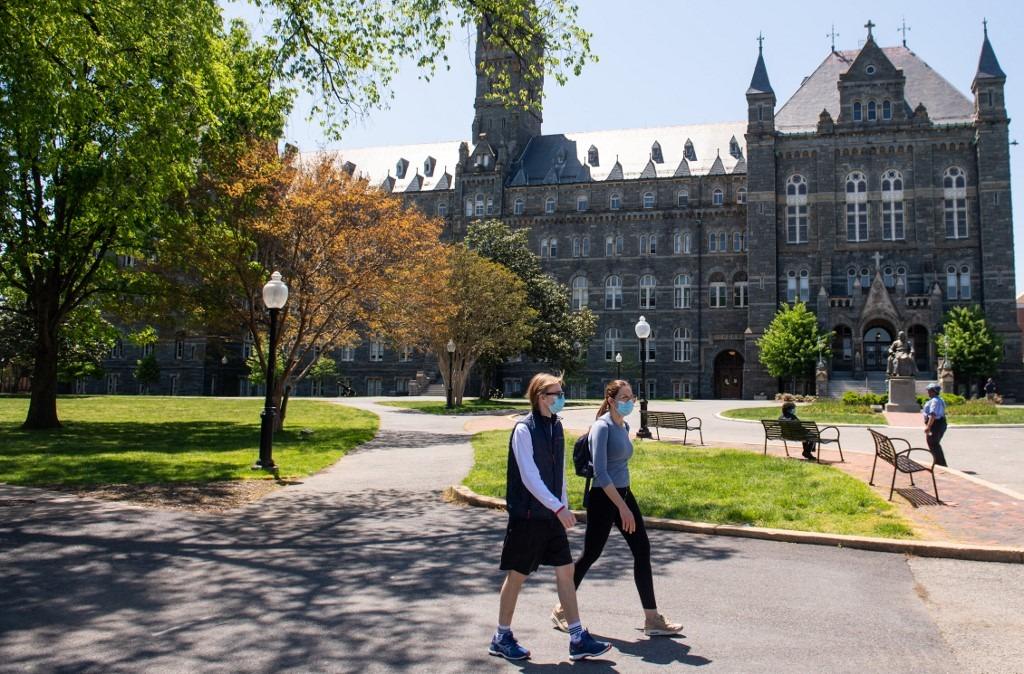 The campus of Georgetown University is seen nearly empty as classes were cancelled due to the coronavirus pandemic, in Washington, DC, May 7, 2020. (SAUL LOEB / AFP)
The campus of Georgetown University is seen nearly empty as classes were cancelled due to the coronavirus pandemic, in Washington, DC, May 7, 2020. (SAUL LOEB / AFP)
WASHINGTON - The US Immigration and Customs Enforcement (ICE) on Monday announced that international students may have to leave the United States if their universities switch to online-only courses for the fall 2020 semester due to the COVID-19 pandemic.
Otherwise they will risk violating their visa status.
"Nonimmigrant students within the United States are not permitted to take a full course of study through online classes," said the ICE in a statement.
"If students find themselves in this situation, they must leave the country or take alternative steps to maintain their nonimmigrant status such as a reduced course load or appropriate medical leave," according to the statement
Under the new guidelines modified by the Student and Exchange Visitor Program (SEVP) run by the ICE, the US Department of State will not issue visas to students enrolled in schools and/or programs that are fully online for the fall semester, nor will US Customs and Border Protection permit these students to enter the United States.
Active nonimmigrant students currently in the US enrolled in such programs must depart the country or take other measures, such as transferring to a school with in-person instruction to remain in lawful status, according to the statement.
"If not, they may face immigration consequences including, but not limited to, the initiation of removal proceedings," the statement said.
Meanwhile, nonimmigrant F-1 students attending schools operating under normal in-person classes are bound by existing federal regulations. Eligible F students may take a maximum of one class or three credit hours online, according to the statement.
Nonimmigrant F-1 students attending schools adopting a hybrid model mixing online and in person classes, will be allowed to take more than one class or three credit hours online, said in the statement, noting these schools must certify to SEVP, through the Form I-20.
REAE MORE: Trump order temporarily limits US immigration during virus crisis
"The above exemptions do not apply to F-1 students in English language training programs or M-1 students pursing vocational degrees, who are not permitted to enroll in any online courses," said the statement.
Schools should update their information in the Student and Exchange Visitor Information System (SEVIS) within 10 days of the change if they begin the fall semester with in-person classes but are later required to switch to only online classes, or a nonimmigrant student changes their course selections, and as a result, ends up taking an entirely online course load, the statement added.
F-1 nonimmigrant students pursue academic coursework and M-1 nonimmigrant students pursue vocational coursework while studying in the United States.
The SEVP had allowed for foreign students to take their spring and summer 2020 courses online while remaining in the United States due to the COVID-19 pandemic
The SEVP had allowed for foreign students to take their spring and summer 2020 courses online while remaining in the United States due to the COVID-19 pandemic.
The announcement came as numerous US higher education institutions are beginning to make the decision to transition to online courses as a result of the pandemic. Harvard and Princeton said Monday they will allow some students back to campus for the fall term, but offer most instruction online even for those who return in person.
ALSO READ: US Supreme Court lets Trump immigration policy take effect
Brad Farnsworth, vice president of the American Council on Education, told CNN that the announcement caught him and many others by surprise.
"We think this is going to create more confusion and more uncertainty," said Farnsworth, questioning what would happen if the public health situation deteriorates in the fall and universities that had been offering in-person classes feel they have to shift all courses online to stay safe.
"The bigger issue is some of these countries have travel restrictions on and they can't go home, so what do they do then?" asked Theresa Cardinal Brown, director of immigration and cross-border policy at the Bipartisan Policy Center, "It's a conundrum for a lot of students."
International enrollment in the US is down in every category, undergraduate, graduate and non-degree, with 269,383 enrolled in the 2018-2019 school year, compared with a high of 300,743 new students in 2015-2016, according to the Institute of International Education.
Data from the US Commerce Department showed that international students contributed US$45 billion to the country in 2018.
The US Department of Homeland Security plans to publish the procedures and responsibilities in the Federal Register as a Temporary Final Rule.


